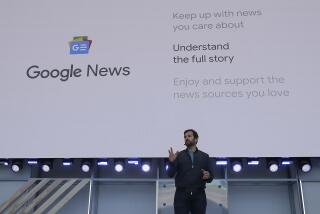San Francisco Newspaper Decision in Judge’s Hands
- Share via
SAN FRANCISCO — A federal judge began weighing the future of this city’s two daily newspapers as the curtain dropped Wednesday on a high-profile antitrust trial highlighted by revelations about the way government and the media sometimes intertwine.
U.S. District Judge Vaughn Walker is being asked to block the $660-million sale of the San Francisco Chronicle to rival Hearst Corp., which hopes to hand off its afternoon Examiner to the owners of a thrice-weekly throwaway newspaper.
In a city that never tires of good theater, Walker’s courtroom has captured the civic spotlight during a two-week trial that could be used as a legal precedent for how U.S. newspapers are bought and sold.
The biggest bombshell came on the first day as Tim White, the Examiner’s publisher, testified that he engaged in “horse trading” of favorable editorial treatment to gain Mayor Willie Brown’s support of Hearst’s plans. Hearst executives denied any deal with Brown took place and put White on leave.
During closing arguments Wednesday, attorneys for the New York-based media giant questioned whether the lawsuit brought by Clint Reilly, who ran unsuccessfully against Brown for mayor last year, was simply an attempt to settle old scores.
Reilly’s attorney, meanwhile, hammered at admissions by White and other Hearst executives, who got federal approval for purchase of the Chronicle only after agreeing to pay $66 million to help Ted Fang, publisher of the San Francisco Independent, take over the Examiner.
Although the non-jury trial has been laced with allegations of ethical lapses and political intrigue, Walker’s decision will probably hinge on more technical questions of antitrust law.
On Wednesday, both sides cited decades of federal rulings governing the sorts of joint operating agreements that allow rival newspapers such as the Chronicle and Examiner to keep separate editorial staffs while having unified business operations.
Joseph Alioto, Reilly’s attorney, argued that Hearst used the joint operating agreement to ward off competitors last summer and buy the Chronicle. The operating agreement, he said, had served as a “stepping stone to monopoly.”
The deal with Fang and his politically prominent family, Alioto said, is “a sham and a farce” that would culminate in the Examiner’s folding once the $66-million subsidy from Hearst was exhausted, leaving San Francisco a one-newspaper town.
Alioto reiterated his request to block the Chronicle and Examiner sales and asked Walker to scrap parts of the papers’ joint operating agreement that have hurt attempts by other media chains to buy either paper. The operating agreement, hatched in 1965, gives each partner a chance to outbid other potential buyers and prevents the purchase by any media outlet operating within 60 miles of San Francisco.
Alioto predicted that Hearst will jack up advertising rates and limit editorial diversity once it has a lock on the larger Chronicle--and the bulk of the city’s daily newspaper readers.
Hearst attorneys countered that dominance is anything but assured, pointing out how Knight Ridder and other deep-pocketed competitors are making headway in the Bay Area media market. Knight Ridder, owner of the San Jose Mercury News, recently announced plans to dramatically expand its San Francisco presence.
Hearst attorney Gary Halling also noted that none of the agencies that had scrutinized the sale--including the U.S. Justice Department and the San Francisco city attorney--had stepped in to challenge the deal.
The deal with the Fangs was a good “business decision” that helped Hearst win approval from the Justice Department, said Gerald A. Connell, another attorney representing Hearst. Justice Department officials, he said, had threatened to sue Hearst if it simply shut down the Examiner and bought the Chronicle.
Fang has promised to operate a leaner Examiner that would focus exclusively on San Francisco and abandon any pretense of covering the entire Bay Area.
On Wednesday, the judge repeatedly questioned why Hearst ballyhooed the deal with Fang in March as a way to keep two competing newspapers in San Francisco, but then admitted at trial that the papers would be playing in different leagues.
The trial, Walker observed, has seen “an awful lot said that hasn’t been completely forthright.”
The judge said he would review the issues as quickly as possible and issue a ruling soon.
More to Read
Sign up for Essential California
The most important California stories and recommendations in your inbox every morning.
You may occasionally receive promotional content from the Los Angeles Times.













